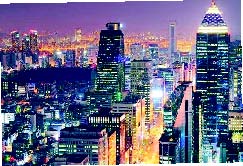With Ireland and South Korea connected through a working holiday programme, ANDREW FARRELL gives the lowdown on one of Asia’s most technologically advanced countries
 THE CULTURE shocks in Korea are not as obvious as one might assume. For starters, Korea is a G-20 nation, and has the fourth largest economy in Asia. The global recession never hit here as hard as in many of the world’s other leading nations.
THE CULTURE shocks in Korea are not as obvious as one might assume. For starters, Korea is a G-20 nation, and has the fourth largest economy in Asia. The global recession never hit here as hard as in many of the world’s other leading nations.
Some evidence of this can be seen by McDonald’s’ decision to quadruple its South Korean franchises from approximately 250 to 1,000. Fast food is indeed popular with the people, as well as the roughly 37,000 American troops still stationed in South Korea, mainly in the capital Seoul, to protect one of the great Cold War symbols, the Demilitarised Zone (DMZ).
When you add all that together, plus the big tourist industry, downtown Seoul could just as easily be London, New York, Sydney or Toronto. There are western-style restaurants everywhere, and a large proportion of the population speak good English. It’s not necessary to learn the Korean language to get along, although it really helps if you want to communicate better with the locals.
As for other cultural nuances, you simply get used to sitting on the floor eating your food at a restaurant, taking off your shoes in apartments and at school, and using chopsticks all the time.
We’re obviously talking about two enormously different societies, in Ireland and Korea, but life here is not a million miles dissimilar to home, so you settle in really quickly. The traditional food takes some time to adjust to, as most of the stuff is spicy, and kimchi – the national dish of pickled vegetables – is not for everyone. But at least you don’t see dog on the menu too often!
The benefits of living in Korea are numerous. If your interest has always been south east Asia or travelling around Oceania, this is the perfect location for earning some money before heading off.
Korea is extremely safe, despite the perception at home; it’s very modern and has a wonderfully friendly society. Work here feels more like a working holiday than a job, as the hours are fantastic (I work Monday to Friday, 9am to 2.40pm), and while the money may not be brilliant by Irish standards, the monthly pay makes for a very comfortable living as Korea is a lot cheaper than Ireland (for example, in the city of Gwangju where I live, a pint of local beer costs just €1.20).
Teaching English is also a worthwhile experience. Apart from daily interactions with young children, you’ll make Korean friends and get to see into their lives. Irrespective of age, most Koreans, whether married or single, will still live with their parents in huge apartment buildings, and there is some pressure for women in particular to marry by 30.
I guess this, along with many other things, is part of the culture shock, but you never get to truly experience it unless you live here and befriend the locals, as opposed to just travelling as a tourist.
I can’t think of much in the line of drawbacks. On the exchange programme we get free return airfare, free accommodation, a free mobile phone, and pay little tax.
I have met people with horror stories about the school they were working in, such as the hours, the children, and the extra duties they had to carry out, but that’s not my experience. I work in a private kindergarten with 12 other foreign teachers, so you are immediately brought into something resembling a family, and it makes the transition much smoother.
On the downside, the holidays are scarce, especially in a private school: you get just one week in summer, plus some long weekends in autumn, Christmas and for Buddha’s birthday in May. Many holidays here fall on a Saturday, so you don’t get the time off. But in fairness, all teachers will be aware of this before coming over.
I can’t recommend any short term working opportunities, because all teaching contracts will tie you down for a year, with the option of staying on. There is generally a high turnover of staff in English schools, as some people realise when they get here that teaching children, or living in Asia, is not their thing.
My advice for anyone thinking of moving over would be to really think hard about the decision. The lifestyle and culture may not be as daunting as you think, but this is still a very big leap to make. You’ll be without your rugby and GAA, Irish TV, family and friends.
It is absolutely worth it coming over here, and Korea will not lock you up if you decide the gig is not for you, but it’s best to be sure.
Andrew Farrell is working as an English language teacher in Korea











